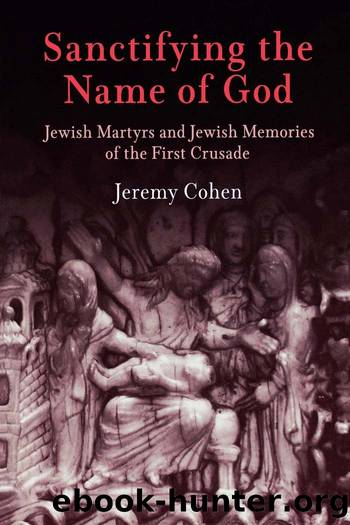Sanctifying the Name of God by Cohen Jeremy;

Author:Cohen, Jeremy;
Language: eng
Format: epub
Publisher: University of Pennsylvania Press, Inc.
âGet Out of the Fire/Light [ur/or], You Still Can Be Saved [le-hinnatzel]â
This final occurrence of the verb âto saveâ in Isaacâs story (line 67) warrants a section of this chapter unto itself, and we must here take note of an additional wordplay. The Hebrew words or and ur, meaning light and fire, respectively, are written exactly the sameâaleph-vav-reshâand differ only in their pointing or vocalization. The unvocalized text of the chronicles thus allows for potentialâand meaningfulâconfusion between the two words, which appear in various permutations throughout our story.
As is well known, the symbolic language of religions typically uses light to denote the divine, enlightenment, and salvation, while using fire to suggest destruction, punishment, and hell. No wonder that Isaac yearns (line 24) to reside in the company of other martyrs in heaven and thereby to reach âthe great lightâ (in Hebrew ha-maâor ha-gadol, a form of or which allows for no confusion with ur).18 On the other hand, Isaacâs compatriot in our story is named Uri, meaning my fire, and one cannot but wonder if somehow the narrative balances our heroâs heavenly, otherworldly aspirations with a hint of an orientation toward the underworldly. The contrast between or/light and ur/fire reaches a climax near the end of the scene, in a passage worth quoting once again.
The pious Master Isaac then went back once again to burn the synagogue and ignited the fire at all the entrances. And the pious one went repeatedly from one corner to another, his hands spread forth toward the sky to his heavenly father, and he prayed to the Lord out of the fire in a loud, pleasant voice. The enemy shouted to him through the windows: âWicked man, get out of the fire; you still can be saved.â They extended a beam to him to pull him from the fire, but the righteous one did not want it. There was burned a blameless, upright, God-fearing man; his soul is interred in the lot of the righteous in the Garden of Eden. â¦
When Master Isaac set his fatherâs house and the synagogue afire, Master Uri was in a different house, but he wanted to help Master Isaac burn the synagogue and there to sanctify Godâs name with his friend. Yet he could not get to him, because the attackers had arisen from their beds in the middle of the night, having sensed the fire; and before he reached him, they killed him on his way before he arrived at the fire where Master Isaac burned to death. There both of them, wholehearted and of one mind, fell together before the Lord for the sake of his name, â[Lord] of hosts.â Regarding them and others like them it is written, âHe who sacrifices an offering of thanksgiving honors me.â
Five times in this passage (lines 63, 67, 68, 80, 81) the chronicle uses the ambiguous word ur for fire, allowing for confusion with or/light; the fact that an alternative nonambiguous term for fireâesh (as in line 65)âalso appears suggests that the storyteller was sensitive to the conflicting implications of his vocabulary.
Download
This site does not store any files on its server. We only index and link to content provided by other sites. Please contact the content providers to delete copyright contents if any and email us, we'll remove relevant links or contents immediately.
| Haggadah | Hasidism |
| History | Holidays |
| Jewish Life | Kabbalah & Mysticism |
| Law | Movements |
| Prayerbooks | Sacred Writings |
| Sermons | Theology |
| Women & Judaism |
The Power of Habit by Charles Duhigg(3128)
Man's Search for Meaning by Viktor E. Frankl(2668)
Mckeown, Greg - Essentialism: The Disciplined Pursuit of Less by Mckeown Greg(2428)
MOSES THE EGYPTIAN by Jan Assmann(2411)
Devil, The by Almond Philip C(2324)
The Complete Dead Sea Scrolls in English (7th Edition) (Penguin Classics) by Geza Vermes(2270)
Unbound by Arlene Stein(2267)
I Capture the Castle by Dodie Smith(2034)
Schindler's Ark by Thomas Keneally(1877)
The Invisible Wall by Harry Bernstein(1799)
The Gnostic Gospel of St. Thomas by Tau Malachi(1782)
The Bible Doesn't Say That by Dr. Joel M. Hoffman(1676)
The Secret Doctrine of the Kabbalah by Leonora Leet(1601)
Political Theology by Carl Schmitt(1577)
The Jewish State by Theodor Herzl(1533)
A History of the Jews by Max I. Dimont(1523)
The Dead Sea Scrolls Bible by Martin G. Abegg(1511)
The Book of Separation by Tova Mirvis(1485)
Oy!: The Ultimate Book of Jewish Jokes by David Minkoff(1362)
